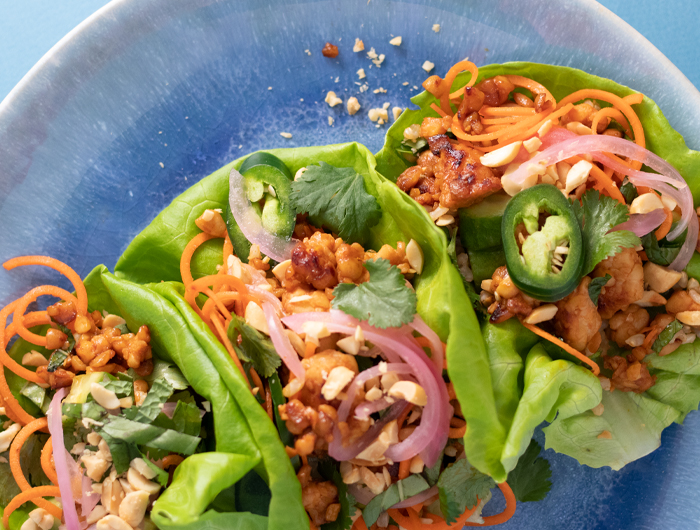Eat more tofu and tempeh

Tofu, yuba ("tofu sheets"), and tempeh have a stellar—and well-deserved—reputation. Where does it come from? We've got 5 reasons to pile on these soy superstars.
1. They pack in plenty of protein.
A 3 oz. serving has anywhere from 8 grams (in “firm” tofu) to 10 grams (in “extra-firm” tofu) to 15 grams (in tempeh or “super firm” tofu). For a plant protein with just 80 to 150 calories, that’s a deal.
2. They come from soybeans, so they’re uber-nutritious.
Protein isn’t the whole ballgame. Tofu is firmed-up soy milk. Tempeh starts with whole cooked soybeans. So either way, you can count on some magnesium and iron. Plus, you get a decent dose of calcium (from many brands of tofu) or potassium and fiber (from tempeh).
Soybeans also bring the good kind of fat to your table. It’s not just that soybeans (and tofu and tempeh) are low in saturated fat. They also supply healthy unsaturated fat, which can lower your LDL (“bad”) cholesterol.
3. You control (most of) their salt.
Sure, you can find plant protein in veggie “meats” like packaged soy burgers, sausages, nuggets, etc. But some items are also high in salt. Starting from scratch with your own tofu or tempeh lets you add plenty of flavor without too much sodium.
4. They’re easy. Really.
Just crumble, chop, or slice. Then prep a few punchy ingredients, and you’re ready to start cooking! Got five minutes? You’ve got time to sauté tofu or tempeh. And—unlike chicken or fish—both are nearly impossible to overcook.
5. They’re ready for anything.
Whether it’s BBQ sauce, an Asian stir-fry, or an Indian curry, tofu and tempeh are game. Healthy, fast, versatile…and delicious.
Are you trying to cook more tofu and tempeh?

Start with a few of our tried-and-tried tips for buying and preparing the super soy proteins.
Know the difference. Tofu and tempeh are both made from soy, but that’s where the similarities end. Softer, milder tofu starts with soy milk that firms up before getting pressed into blocks. Tempeh starts with cultured whole cooked soybeans (and sometimes grains) that bind together as they ferment. The result: nutty, hearty, and chewy.
When in doubt, go firm. Most of our Healthy Cook’s recipes call for “extra-firm” or “firm” tofu. You can also use “high protein” or “super firm,” which have more protein per bite and a denser texture. “Silken” tofu is softer and falls apart easily. (Save it for miso soup and blended sauces, dips, and dressings.)
Head to the refrigerator case. That’s where you’ll find tempeh and firmer tofu. (Some silken tofu is shelf stable.)
Don’t sweat the shelf life. Unopened, tofu and tempeh can last for months in the refrigerator. Don’t plan to cook it by the “use by” date? Freezing either one in its unopened package extends that to a year or so. When opened, tempeh should have a fresh, earthy, yeasty smell. Tofu should have little to no smell.
Treat tofu right. Most tofu is packaged in water. Drain, then blot dry with a paper towel or clean kitchen towel. Exceptions: “high protein” and “super firm” tofu come vacuum packed—no draining needed.
To press or not to press? Pressing tofu squeezes out water, which speeds browning when you sauté or bake it. But pressing isn’t critical. Short on time? Buy “high protein” or “super firm.” Want to press? Set your tofu on a large plate or sheet pan, put another plate or sheet pan over it, then put a few big cans or a heavy skillet on top. Let it press while you prep the rest of your ingredients.
Looking for tofu and tempeh recipes? Our Healthy Cook has loads of them. Think of a BBQ Tempeh Bowl. Or Crispy Tofu & Pan-Roasted Broccolini. Or Sweet & Sour Tempeh Wraps. What are you waiting for?
Looking for yuba tips and recipes? Check out our yuba Food Find. And try our Healthy Cook's recipes for Fried Black Rice & Yuba, Yuba Snow Pea Stir Fry, and Yuba Pad Thai.
Photos: Kate Sherwood/CSPI.
Support CSPI today
As a nonprofit organization that takes no donations from industry or government, CSPI relies on the support of donors to continue our work in securing a safe, nutritious, and transparent food system. Every donation—no matter how small—helps CSPI continue improving food access, removing harmful additives, strengthening food safety, conducting and reviewing research, and reforming food labeling.
Please support CSPI today, and consider contributing monthly. Thank you.
Tags
Topics




